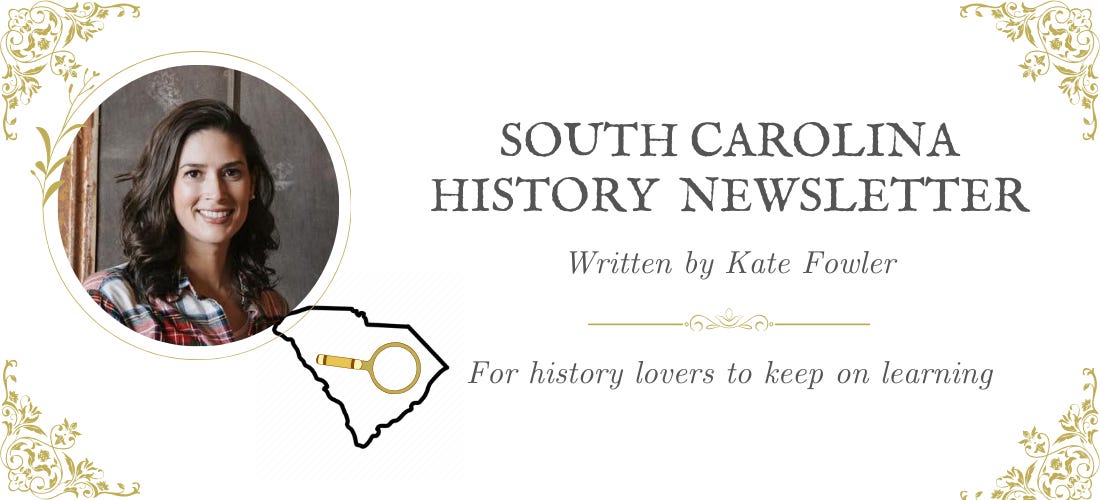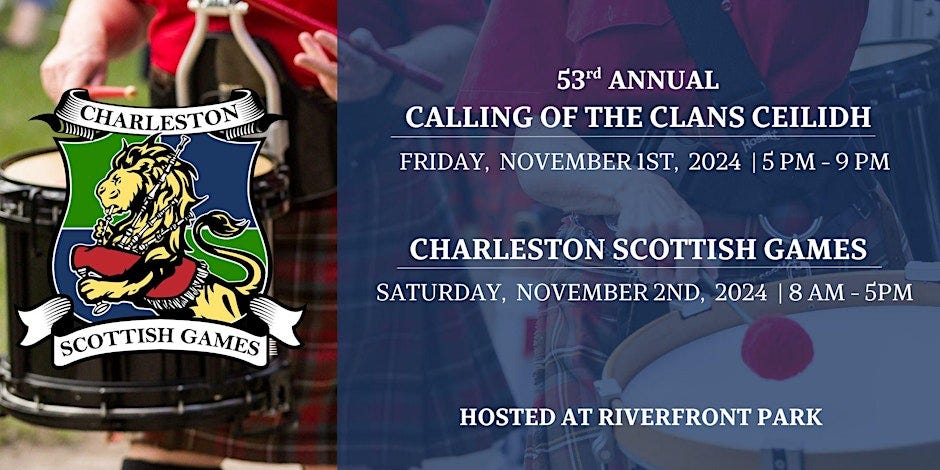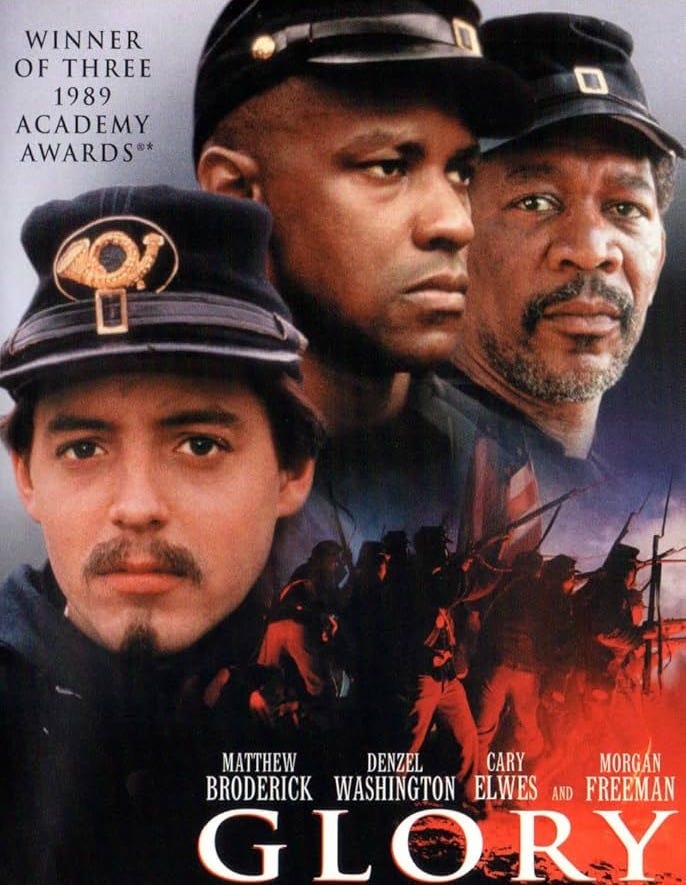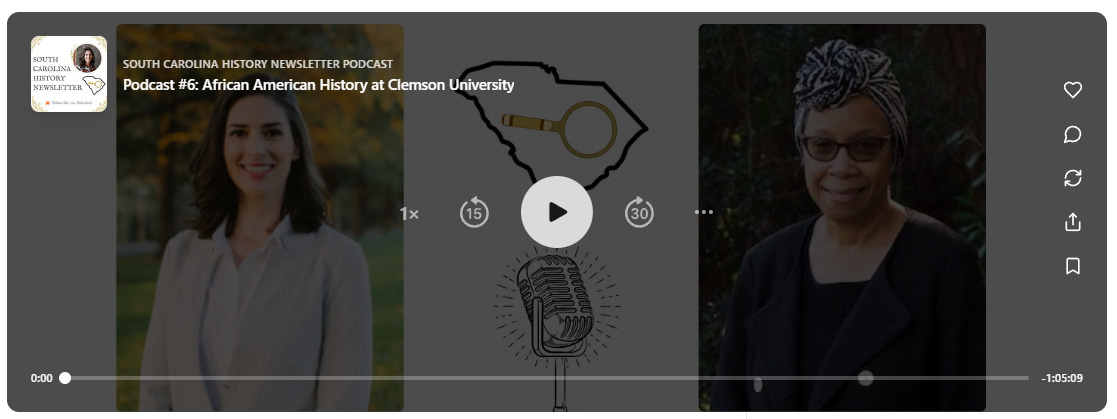#115: African American history at Clemson (Podcast w/ Professor Rhondda Robinson Thomas), Charleston Scottish Games, and "Glory"
For South Carolina history lovers far and wide! Published weekly on Monday mornings. Enjoy weekly SC history articles, interviews w/ experts, book recommendations, and upcoming SC historical events.
Dear reader,
Welcome to SC History Newsletter #115!
As always, I’d like to welcome the following new subscribers to our community. Thank you for your interest in South Carolina history!
theusc
wtkbakj
billray01
marsha01
oakwoodnc
bowenbradc
New friends! If you are new to the newsletter, please note that there are over 100 previous SC History newsletters on topics ranging from the founding of Charleston, sunken Confederate submarines, railroad tunnels filled with blue cheese, and so much more! I encourage you to take a look at our archive here.
Send me your topic ideas: I love it when subscribers write to me! Have a SC History topic or question you’d like for me to write about? Just reply to this email and let me know!
Join us on social: Please join us & keep the conversation going by becoming a member of our SC History Newsletter Facebook Community here! I can’t wait to meet you. :)
If your email “cuts off”: In your email app or website, if my emails “cut off” for you, please click the title of the email and it will take you to the full post on the Substack. I don’t want you to miss any content!
And now, let’s learn some South Carolina history!
Yours truly,
Kate
(Writing from Greenville, SC)
➳ Featured SC History Events
Please note our featured SC History Event below, and click here to visit my SC History Events Calendar that organizes all the upcoming SC history events I have discovered.
Please let me know if you’d like to add an event to the calendar! Reply to this email to send me your events.
Event Recommendation of the Week:
Saturday, November 2nd from 8:00 am - 5:00 pm | “53rd Annual Charleston Scottish Games and Highland Gathering” | Riverfront Park | North Charleston, SC | Tickets & information
“With its inaugural event in 1971, the Charleston Scottish Games & Highland Gathering is the second oldest event of its kind in the southeast. Drawing visitors from around the country and abroad, the Games brings in over 8,000 guests, immersing visitors in Scottish heritage and history. The Scottish people have made a large impact on South Carolina, helping it to become the state it is today. From music and food, to political and scientific contributions, Scottish heritage is something to be celebrated and promoted in modern life. The Charleston Scottish Games and Highland Gathering is on a mission to do just that. The Games showcases Scottish traditions, culture, and history in a fun and interactive way for people all over the world.”
➳ SC History Book, Article, & (now!) Movie Recommendations
“Glory” directed by Edward Zwick
(Note from Kate: I have decided to add movie recommendations to this section of the newsletter! This movie has been recommended by many of our podcasts guests and it’s been on my list for quite some time. Have you seen it yet? Leave a comment below!)
“One of the finest films ever made about the American Civil War, Glory also has the honor of being the first major Hollywood film to acknowledge the vital contribution of African American soldiers to the country's historic struggle. Based on the books Lay This Laurel, by Lincoln Kirstein, and One Gallant Rush, by Peter Burchard, and the wartime letters of Robert Gould Shaw, the film tells the story of the 54th Regiment of the Massachusetts Volunteer Infantry, an all-black unit comprising Northern freemen and escaped slaves. Under the command of Shaw (played by Matthew Broderick), the 54th served admirably in battle until they made their ultimate demonstration of bravery during the almost suicidal assault on the Confederate Fort Wagner in Charleston, South Carolina, on July 18, 1863. Glory achieves its powerful impact by meticulously setting up the terrible conditions under which these neglected soldiers fought, and by illuminating the tenacity of the human spirit from the oppression of slavery to the hard-won recognition of battlefield heroism. Although Denzel Washington deservedly won an Oscar for his supporting role as a runaway-slave-turned-soldier, Glory faced some tough competition at the 1989 Academy Awards (against popular hits like Driving Miss Daisy and Dead Poets Society) and was shut out of nearly all the major categories. Since then, it's been duly recognized by historians and critics as a classic film of its genre.”
—Jeff Shannon, film critic
Have you watched Glory? Tell us your review! Leave a comment below!
➳ SC History Topic of the Week:
In our SC History Podcast #6, I was so excited to interview Professor Rhondda Robinson Thomas, the Calhoun Lemon Professor of Literature at Clemson University, where she teaches, researches, and writes about early African American literature in the Department of English.
In today’s interview, we discuss her work as the founder of the Call My Name, a crucial and inspiring project that seeks to research and document the stories, acknowledge the contributions, and honor the legacy of 7 generations of people of African descent in Clemson University’s history.
How to watch or listen to this interview:
Listen on Substack:
Click here or click on the image below to listen on the Substack podcast player.
Read the interview transcript:
On the Substack podcast page, you can toggle to the transcript of the episode at the top of the post.
Listen on iTunes:
Listen on iTunes by clicking below & subscribing
Watch/listen on YouTube:
And here are time stamped highlights of our interview, including 3 reader questions:
4:55 - Professor Thomas discusses how when she first arrived at Clemson in 2007, slavery was not taught in the tours of John C. Calhoun’s Fort Hill Plantation House. Clemson is built on the plantation’s land. At the height of the plantation, there were 100 enslaved people working on the plantation.
7:11 - Professor Thomas outlines what the “Call My Name” project is and how it seeks to recover and share stories of the African American experience at Clemson from the very beginning when the land was still a plantation — to today.
10:06 - Professor Thomas describes what obstacles she has faced in her research for the Call My Name project
11:58 - Professor Thomas describes what has encouraged her and surprised her in her research for the Call My Name project
14:06 - READER QUESTION from David M.: "Did the University as an entity enslave people? Since there is now a list of names and possible connections to today’s descendants, is there an effort to offer “scholarships” to any of these individuals. Also is there any documentation on the lives [of the enslaved people] on campus - housing churches etc."
14:37 - Professor Thomas discusses the history of slavery at the Fort Hill plantation — and tells us about specific enslaved people whose stories she and her team have uncovered
21:27 - READER QUESTION from Randy B.: "Hello Professor Thomas! Do you have any records of slaves who served in the Confederate Army from Clemson University? Thanks!"
21:56 - Professor Thomas discusses the practice of Confederate soldiers taking their slaves as their personal cooks into war
22:54 - READER QUESTION from Gabriel N.: "How easy (or hard) is it for someone who has grown up in this area - and as far as they know, parents were also born and raised in this area, to try to trace their lineage to their slave ancestors and really, in her experience, what is the curiosity level of local people to find out?"
23:14 - Professor Thomas discusses her research into the genealogy of the enslaved people who worked at Fort Hill plantation and outreach to these families today
27:48 - Professor Thomas discusses top 3 “eureka” moments in her research, including learning about Issy, an enslaved girl, who tried to set fire to John C. Calhoun’s plantation home.
35:58 - Professor Thomas describes evidence of convict labor in buildings on the Clemson campus today
44:36 - Professor Thomas discusses how the Black experience has changed at Clemson over the years and the impact of the Call My Name project
49:00 - Professor Thomas discusses the play she is writing about the Call My Name project and the impressive team who is helping her bring it to life
53:29 - Kate walks Professor Thomas through the “Carolina Questionnaire!”
55:55 - Professor Thomas shares that she believes South Carolina is “the epicenter of American History” and Kate agrees!
1:01:48 - Professor Thomas describes how people can get involved and support the work she is doing with the Call My Name project
1:03:35 - Farewells & good byes!
Here is Professor Thomas’s bio:
Rhondda Robinson Thomas is the Calhoun Lemon Professor of Literature at Clemson University where she teaches, researches, and writes about early African American literature in the Department of English. She has published Call My Name, Clemson: Documenting the Black Experience in an American University Community, which received honorable mention in the National Council on Public History’s 2021 book awards and co-edited The South Carolina Roots of African American Thought. Thomas is the faculty director of the award-winning Call My Name Project, for which she has received a fellowship, grants, and gifts through the Clemson University Foundation. She is writing a new play in collaboration with the Tectonic Theater Project, developing a NEH-funded traveling museum exhibit, and producing an eight-part video series based on research for Call My Name and co-directing the SC Upstate Black Heritage Trail project. In 2021, Thomas was Clemson University’s Researcher of the Year and recipient of the Class of '39 award, the highest honor given to Clemson faculty for service to the university, community, and/or nation. Currently, she serves as the Coordinator of Research and Community Engagement for Clemson University’s Cemetery Historic Preservation Project, chair of the Advisory Committee for Clemson's Memorial for Black Laborers project, and as a member on the South Carolina State Board of Review for the National Register of Historic Places.
Thank you, Professor Thomas!
Did you enjoy today’s interview? Any additional questions for Professor Thomas? Leave a comment below!
➳ Call My Name Project Helpful Links
I always want to improve my work. Answer the poll below to give me your review of today’s newsletter. I also welcome your suggestions for new content! Simply reply to this email with your ideas. Thank you!















